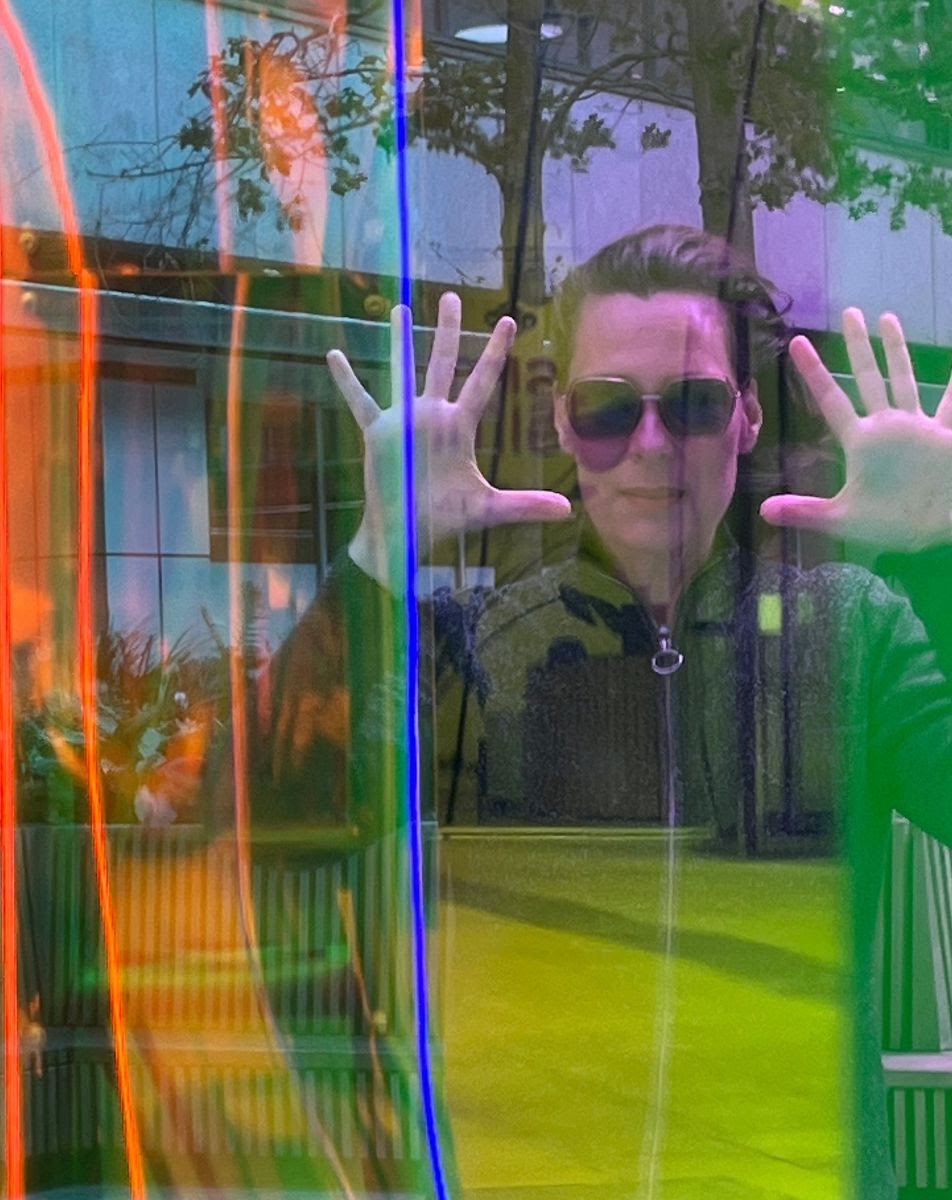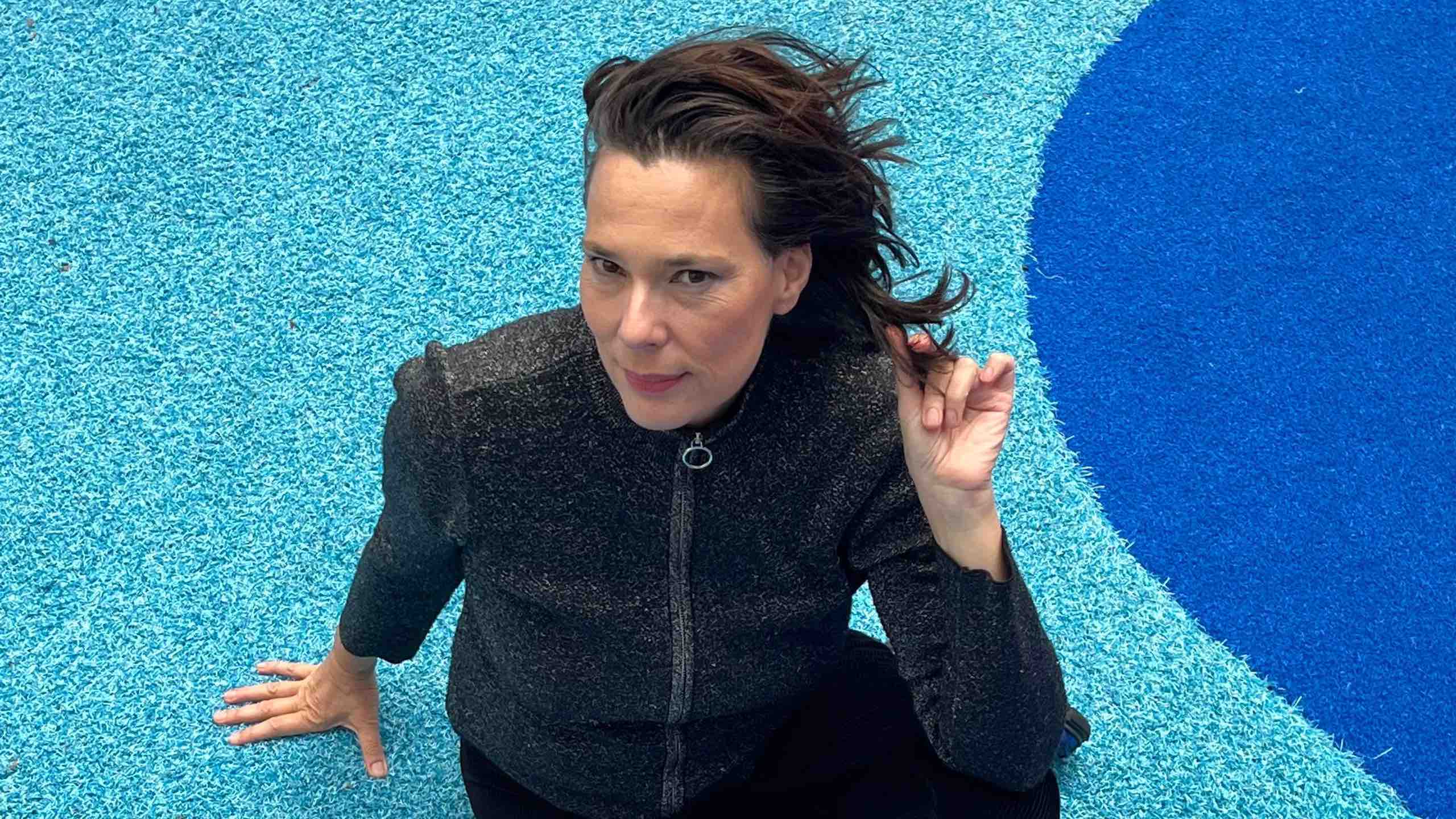Laetitia Sadier originally wanted to name her new album “Globe Artichoke.” “Globe” refers to her love for the Earth and the way she cares for its people deeply. If there’s an underlying message that courses through this record, it’s one of peace and optimism. We are a mean, selfish, and poisoned species, but there is still hope. The “artichoke” comes from the Stereolab vocalist’s love for making art, but—back to that idea of us being broken individuals—the world is choking. But even that was too harsh for Sadier, who radiates empathy, and, by such nature, has made this thrilling new solo album—eventually retitled Rooting for Love—a declaration of grace for herself and others.
When I ask Sadier (who’s also one half of the vastly underrated Modern Cosmology) the meaning behind the settled-upon title, the answer comes quickly: “I think it’s best to encourage the more positive instincts of being human. Whatever positive instincts we have toward peace and toward love—as opposed to war, hatred, and fear—we must follow,” she explains. “Now it’s very clear, I find. I feel it’s best to be love-affirming.” That’s the warmth you feel throughout Rooting for Love; it’s like that first sip of coffee in the morning, or a blanket at 2 p.m. on a Saturday. It’s an album that encourages goodness, and finds Sadier holding herself to the same standard she urges us to live up to.
During our conversation, Sadier suggests I spend five minutes a day doing an exercise in which I close my eyes and envision the world exactly as I wish it was. Her world—the very first thing she imagines—is one without fossil fuels. It’s telling that her immediate desire isn’t personal or even communal. It’s global.
Did the title of the new album inform its lyrical themes, or did you come up with these songs first and then the title reflected that?
The songs came first, they kind of trickled through. The first chords to the first song arrived in August 2018. I don’t have to make an album. Although it’s what I do, I don’t have to. I want these things to come about very organically. And then, of course, there comes a moment where you’re kind of taken into the game and you’re like, “Oh yeah, songs come to me.” Then I really engage with making an album. The songs arrived one after the other, but all sorts of things happened in the process, such as Stereolab getting back together. So of course that took precedence—choosing the songs [with Stereolab], rehearsing the songs, going on the road. We did quite a lot of touring in 2019.
Of course, then people being locked down by the pandemic, all of that kind of stopped the process a little bit. It was supposed to come out in 2021, and then it was 2022, then it was supposed to come out last year. But I had this other album that I also recorded over a long period of time with no rush, no pressure, just the pleasure of doing something with Modern Cosmology. So somehow it was evident that Modern Cosmology had to come out first. “I’ll just wait until 2024,” and here we are. I feel it’s the perfect timing, actually. I’m really pleased.
“It’s best to encourage the more positive instincts of being human. Whatever positive instincts we have toward peace and toward love—as opposed to war, hatred, and fear—we must follow.”
Outside of collaboration, obviously, what makes a solo record different for you?
Well, if it’s a Laetitia Sadier record, or a Source Ensemble record, [then] I’m at the helm of the ship, really, fully. It’s more of a personal, all-encompassing process—although I do like to surround myself with other singers. In that sense, it’s still a collective process, but I’m the orchestrator. I’m the conductor and, yes, I feel more directly responsible for the sound of things, having written the songs. Also, there’s a lot of autonomy there—full autonomy—because I’m solely responsible for the writing.
I don’t really co-write, although “Don’t Forget You’re Mine” was written with friends. It’s the one where a well-off academic couple come home and the woman’s had some honors somewhere. So there was a bit of a to-do about her being honored, and her husband can’t hack it, that she’s having the limelight, and he beats her up. It’s fatal. My friend wrote it, and I think it’s important to sing on this subject because we’re in an era where a lot of the darkness is coming to the light, and I think it’s an essential process for healing, because if it’s kept in the dark, we can’t see it. We’re not conscious of it, and things just carry on.

The album is also a lot about sinister patterns that we reproduce without even being aware that we’re at the mercy of what the program says. It’s become very, very apparent to me over these last few years, because I’ve been really observing my own patterns and why I do things—even though I don’t want to do them, I still do them. I guess one could call it the shadow work, really looking deeply into the shadow. Your shadow’s always behind you, so you can’t really catch it that easily. But I’ve been very mindful of looking into that shadow.
This album reflects a lot of that work, because I find it quite essential that we stop repeating over and over and over again stuff that’s super traumatic and super painful; stuff that assures us that we continue to be in that eternal state of suffering. That’s been really intriguing to me for as long as I can remember: Why are we so attached to our suffering? We have all the tools, and it’s totally within our grasp to live much happier lives, but we somehow play along with a system that’s super alienating. How much longer do we need to play along like this? On the album, I’m just exploring [that idea]. It’s less head-on political, but it explores our internal makeup, what makes us. I want to bring some light onto, “How can we bring a shift out of the darkness, the dark ages?”
When you decided to revisit Stereolab, was there any apprehension to dive back into a part of your life that you had moved on from?
Oh yeah, very much so. I felt that if we did come back together, that it would be very healing. It has been completely healing, beyond my wildest hopes.
“It’s totally within our grasp to live much happier lives, but we somehow play along with a system that’s super alienating. How much longer do we need to play along like this?”
It maybe even recontextualizes some of the older memories, too.
As a band we’ve been through tough episodes, but we’ve come a long way. I think we really love each other, and now this love can really flow freely between each other. I don’t know if it’s because we’re older and that maybe there’s less ego, but it’s not a battlefield on stage. It used to be a fucking battlefield. We were fighting each other. Maybe it was kind of OK because the songs were so fantastic. But for me, it was extremely frustrating because every night I would lose because I’m a vocalist and I can’t turn an amplifier up in my throat. I didn’t like that at all. I didn’t have any pleasure at all in doing that. Whereas now our wig outs are sublime. It’s already much better.
Is there a philosophy that informs the new solo album?
A lot of people have thrown away their heart or have cut it off, and that gives the worst possible results. We’re so incredibly brutal with each other. I think it’s about giving the heart its place as the king. It’s the big master, and it also informs the ability to dream and to imagine. We have to do an exercise every day, to spend five minutes imagining how we want to see the best possible world—what we want to see, what we want to feel, what we want to hear. I’ve been doing it, and the first thing that came to me is “No more fossil fuel.” It stinks. It’s loud. That was my first thing, my ideal world. Clean, clean energy.
We’ve got quite a lot of things to clean up, primarily in ourselves. There’s also this word in French, penser, which means “to think,” but panser is “to Band-Aid, to heal, to take care, to look after.” That’s what the song “Panser l’inacceptable” is named after—to heal the unacceptable. That’s where you start cleaning up. You don’t start cleaning up your neighbor’s home. You start by cleaning up your own house, your own heart. FL







